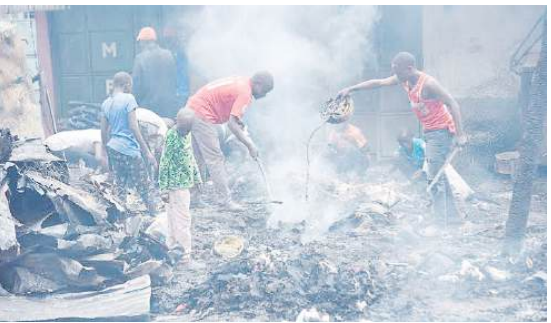

As grief from the Kibra fire lingers, families face the torment of waiting for the identification of bodies. The fire ended lives; now the waiting has suspended others.
Fredrick Okoth’s father was among those who perished in last month’s fire. Beyond the grief, he now has to contend with delayed DNA results that would help the family identify the body and get closure.
For the 21-year-old university student, life feels frozen as the trauma refuses to fade.
“The fact that our dad’s body is still in the morgue and that we cannot identify the body is a trauma on its own. The images of the damage caused by the fire and the charred remains cannot stop playing in my mind,” he said.
His father was in the house alone at the time of the fire. He had been unwell, and that might explain why he wasn’t quick enough to raise the alarm or escape to safety.
“He had been sick for some time, but no one figured he would die such a painful and humiliating death,” Okoth said.
Now, families like his must wait even longer. Authorities informed them late last month that the DNA tests to identify the bodies would take at least a month.
“I envy those who lose loved ones and get to bury them quickly because they get closure faster,” said Rose Wanjiku, whose sister perished in the fire.
On May 29, families began the DNA sampling process at City Funeral Home, holding onto hope that they could finally identify the bodies burned beyond recognition in the early morning tragedy.
But authorities have since told them the results may only be ready after two weeks—or even a month—further stretching their anguish.
For many, the delay is not just emotionally draining but also financially exhausting.
The little support they received from well-wishers and the government is quickly running out. The growing costs of transport, food, and daily needs are becoming unbearable.
In a growing chorus of frustration, affected families are now urging the government to speed up the process so they can give their loved ones a dignified burial and begin the long journey of healing.
At least eight people died in the 5am fire that swept through the Kichinjio area of Makina within Kibra subcounty in Nairobi.
Weeks later, the exact cause of the fire has not been established. It destroyed countless homes in the tightly packed neighbourhood, leaving a trail of ruin and unanswered questions.
“What is disturbing us most is being told that the DNA will take one month,” Janet Syombua said.
Another grieving family member, Musa Murimi, said, “I was only called to collect the bodies of my children. This wait is too long.”
The situation is even more devastating for Judith Ambani, who lost five family members in the fire, barely days after burying her firstborn child. It has been an unbearable period for her.
“DNA will take almost one month. I don’t know what state I will be in by then because even now I’m on medication,” Ambani said, holding back tears.
Her relative, Juliana Wetere, shared in the sorrow. “When you see her here, don’t just see a widow... she just buried her firstborn recently. The wound hasn’t even healed.”
Now, what these families need most is closure. But as days drag on with no answers, their grief only deepens.


![[PHOTOS] Ruto inspects his Naivasha farm](/_next/image?url=https%3A%2F%2Fcdn.radioafrica.digital%2Fimage%2F2025%2F06%2F72a14e8a-a040-48e1-87b3-597dbca6d7c6.jpeg&w=3840&q=100)








